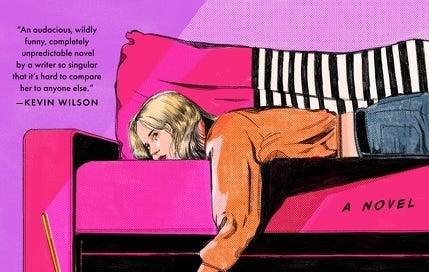“WWE is, Stylistically, About as Far From the Aesthetics of Real Violence as P*rn is From Real S*x.”
Rufi Thorpe on melding pro wrestling and s*x work in her new novel, Margo’s Got Money Troubles.
When Rufi Thorpe’s latest novel, Margo’s Got Money Troubles, was pitched to me, the publicist had me at “ex-pro wrestler father”!
Money Troubles follows college drop-out Margo, who becomes unexpectedly pregnant at 19 to her college professor, and even more unexpectedly decides to keep the baby, with the help of her aforementioned ex-pro wrestler father, Jinx. Ex-pro wrestlers aren’t really known for their exorbitant wealth, so in order to make a living without a college degree, Margo turns to OnlyFans.
Through Thorpe’s detailed and expansive storytelling, we come to understand just how similar the storytelling elements and working conditions of camming and wrestling truly are!
Thorpe was so kind as to answer some questions, via email, about those very things.
The whole book is a celebration of fiction in that sense, a defense of the artificial, an ode to lying.
So why wrestling?! How did you get into it?
I didn’t grow up watching wrestling, but my husband did, and he started putting it on, hoping our boys would fall in love with it. And they do like it, but unexpectedly it was me who fell hardest of all, and I quickly went from watching a couple matches to reading one wrestling memoir after another like it was my job.
Who is your favourite wrestler?
I have two really. I’m a die-hard Bret Hart fan. His technical excellence makes him easy to love, but really it is his earnest-Canadian-ness that won me. But maybe the wrestler I feel the most artistic kinship with is Mick Foley. That first big promo he did as Mankind, the interview with JR, where he is talking about eating worms? The mixture of comedy and profundity is absolutely too delicious.
When did you decide to incorporate wrestling into your writing? Was your journey similar to Margo’s in discovering that wrestling is essentially a soap opera so makes for perfect storytelling fodder?
Well, I remember walking the dogs with my mom and telling her yet another story about a wrestler pooping his pants, and her saying, “I wish there was some way you could put wrestling in your book.” Like maybe if the wrestling stories had another outlet she wouldn’t have to hear quite so many of them! And at first I thought it wouldn’t work, would just be too much, make the novel too much of a cartoon, but the more I thought about it, the clearer the connections between OnlyFans and pro wrestling were and I became determined to bring wrestling into the world of the novel.
Grey area is always more interesting to me.
Likewise, how did you decide to mirror the wrestling aspect of the story with OnlyFans? Because those two are similar, too, in that both wrestlers and sex workers are independent contractors without any protections of a traditional job, they take risks with their bodies, but with the emergence of OnlyFans sex workers have been able to erect (pardon the pun) a barrier between them and their clients.
You’re exactly right—those similarities seemed really important to me, even the way in which both of them were embodying different aspects of male fantasy! The fantasy of violence and the fantasy of sex, for WWE is, stylistically, about as far from the aesthetics of real violence as porn is from real sex. And that physical barrier, the online nature of OnlyFans, made it feel like a larger cultural conversation about sex work and our prejudice against it was possible. So much of the objection to sex work is framed in terms of the physical risk sex workers take on by engaging in sex work. When the bulk of that physical risk is removed by taking the work online, it becomes less obvious what is even objectionable about it. (And of course, frustratingly, much of the physical risk of in-person sex work comes from our society’s refusal to legalize sex work and provide protections for sex workers that are actually useful, so even the level of risk for in-person sex workers is something we could mitigate if we chose.) As OnlyFans took off, I just felt like it was a chance to have a conversation about sex work that was more nuanced and where the ethics didn’t just collapse into black and white. Grey area is always more interesting to me.
What about the meta narrator—you’ve got scenes with Margot in class debating the merits of first-person and third-person narrators, and then you jump back and forth between close first-person, third-person, and I want to say a third future-tense first-person perspective?! Why did you decide to tell the story in that way?
Really, I was just fooling around at first, trying to understand if I wanted to tell the story in first or third person, trying to understand how they were different from each other, what one could do better than the other. But as the themes of the book became clearer to me, I realized that in the same way that Margo was donning the Hungry Ghost mask, I was donning the Margo mask. That she was a persona I was building, just as surely as Jinx built his wrestling persona. The whole book is a celebration of fiction in that sense, a defense of the artificial, an ode to lying. Also, it was just really, really fun to do.





